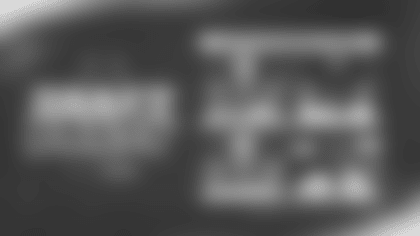Week 13: Lions at Colts
Bill Polian, in his 11th season as Colts president, has a resume unique in the NFL. One of two men to win NFL Executive of the Year five times, Polian in the 1980s built the Buffalo Bills into a four-time Super Bowl participant. In the mid-1990s, he built the expansion Carolina Panthers into a team that made the NFC Championship Game in its second season, 1996. Since joining Indianapolis in 1998, he built the Colts from a 3-13 team in 1997 and 1998 into one that has made the playoffs eight of the last nine seasons, including an AFC Championship Game appearance after the 2003 and 2006 seasons, AFC South titles in 2003, 2004, 2005, 2006 and 2007 and a Super Bowl championship following the 2006 season. Each week during the season, in The Polian Corner, Polian and Colts.com will discuss issues pertinent to the Colts and the rest of the NFL.
Question: A 35-3 victory over the Cincinnati Bengals. For a change during this six-game winning steak, this was one you didn't have to sweat in the fourth quarter . . .
Answer: It was a very nice and easy fourth quarter watching some of the younger players get an opportunity to play. I was happy about that, and obviously happy about the results and glad to see we've kept the streak alive. We have three more to go, so we're getting close to the time when everything counts and there is no margin for error. Here we go again against the Detroit Lions this week.
Q: Do you do any scoreboard watching while the Colts are playing?
A: No. There's really no reason to do so, because there are no scoreboard issues that would affect us at this point. Perhaps as we reach Jacksonville weekend (on December 18), although we will have played, that is probably the time you would begin a little scoreboard watching, but I can't figure out at this stage – and I've tried; in the interest of full disclosure I always say I wait until Thanksgiving to look at the standings – and I have looked at them, but I have not been able to figure out what the various permutations are. I'm going to sit tight for another couple of weeks and I'll follow it on the 22nd of December. There is no situation next week where we can assure ourselves of being in. It's going to go at least through Jacksonville and perhaps beyond, but I don't know what various permutations would have to occur that weekend, so we'll worry about one week at a time and take care of our business. If we do that, then it doesn't matter what anyone else does.
Q: Tennessee clinched the AFC South title on Sunday, ending the Colts' five-season run of division titles. A great season for Tennessee . . .
A: Great credit to them. They've had a great year and they've done a great coaching job. They have stayed healthy and that's the result of a great coaching job. They have handled training camp and the preseason very, very well. They adapted to the 80-man roster very, very well. It has paid off for them. They're a very good football team and hats off to them. They're deserving champions.
Q: Safety Bob Sanders played and had nine tackles Sunday. After missing three games with a knee injury, it seems he's healthy and ready to go for the rest of the season.
A: I think that's the case. All of the reports indicate that he's OK. The preliminary reports were positive and we're looking forward to having him back on the field again this week.
Q: You mentioned watching the young players Sunday. Anyone catch your eye?
A: I thought (cornerback) Dante Hughes did a great job with the interception (late in the game) and (safety) Jamie Silva did a great job on special teams. He was flagged at the end of the game, and to this day, I can't figure out why. I watched the play three or four times. I don't know what the official saw. It was an interception, which meant that Jamie had every right to block the receiver and he did so with his shoulder. I don't know what he called, but we'll find out from the league office. (Defensive tackle) Danny Muir did a really good job. He got extended playing time for the first time and did a very nice job. Those were ones who stuck out. Josh Thomas had some plays at defensive tackle and did a nice job. So pretty much a solid game throughout. I thought Buster Davis did a good job filling in for Gary Brackett (at middle linebacker). By and large, everyone played well. When you get a victory like that, that's usually the case, but those were guys who really hadn't had a lot of extended playing time prior to Sunday and they acquitted themselves well.
Q: A week after not scoring an offensive touchdown in Cleveland, the Colts scored four Sunday, with quarterback Peyton Manning throwing three touchdown passes. With the exception of a fumble on the goal line by tight end Dallas Clark, a very good offensive showing . . .
A: It was a good showing. Dallas even said he wished he had just tucked the ball in and gone down on the 1-yard line and given us a chance to knock it in from there. Those things are going to happen, but it was a good offensive performance. I thought our offensive line did a good job of blocking. We ran the ball effectively again. It's unfortunate the holding call negated a big (running back) Joseph Addai gain. I can't argue with the call. Obviously, they let far worse go, but by the rulebook, it's a hold. The referee called it, so more power to him. I thought by and large offensively we were clicking. We blocked well. We ran the ball with effectiveness. Obviously, we hit lots of big plays in the passing game.
Q: Not a bad day for the special teams, either . . .
A: We let two kickoff returns out that should not have taken place. We could have done a better job hemming them in. It wasn't terrible, but it wasn't up to the standard that we've had for the past four or five weeks, so that's an area we can improve. We'll work on it. That's especially true when you get really good kickoffs. (Kicker) Adam Vinatieri has been terrific kicking off this season, so we'll do what we can to improve that as the weeks go on.
Q: If the Colts and Titans can still each finish 12-4, why is it that the Titans have clinched the AFC South? The Titans don't appear to have clinched an advantage yet in head-to-head games or in division record . . .
A: They did it based on common opponents, which was a tiebreaker that was instituted this past year, I believe. My memory of having voted for that is absolutely blank, so I must have either not been in the room when it was discussed or I have amnesia about it. That's how they did it. I can understand why they did it and here's why. The schedule is in and of itself unbalanced. The only balanced parts of it are your division games and your opponents in the other conference. That gives you a total of 10 games: roughly, two-thirds of the schedule. So, those games are constant. The other games are weighted against the better teams. One plays one, two plays two, three plays three, four plays four. So, the easier-scheduled team would have an intrinsic advantage within the conference. Now that I think of it, I may have been in the room when it was discussed, because I'm repeating all of the talking points. Somewhere in the recesses of my memory, the facts are coming out. Even though it's a change and it's not something we're used to, you can make the argument that it's a little more fair, because it relates to common opponents within the division as opposed to those so-called seeding games coming into play. I could see why people would like that better, but it is a change.
Q: How is it the Colts do such a good job finding collegiate free agents?
A: It's a big part of our scouting operation and our scouting plan. We do a very thorough job of evaluating players at the collegiate level, and when it comes time to decide who to try and sign as a collegiate free agent what we really try to do is throw out the player's level of competition and we say to ourselves, 'Does this player possess the physical qualities to play in the National Football League and if he does, does he possess the psychological and motivational qualities necessary to stand up to competition in the NFL?' If the answer in both cases is yes, regardless of the guy's collegiate pedigree or regardless of his notoriety or what have you, we will take a chance on him. We have had lots of good luck along those lines, mostly with players from small schools or with players whose stature – their height – has been an issue for other clubs. We don't consider height to be a terribly disqualifying factor where there are other teams clearly that do. If you take a look at 3-4 teams – the Cleveland Browns, the New England Patriots, the Miami Dolphins, the Dallas Cowboys – they're by and large very tall. It's just a little different philosophy. We've been fortunate enough to have good players want to come our way, too. It's voluntary on the player's part. You compete financially for them, but it's largely voluntary on the player's part and we've been fortunate to have players want to come here and play.
Q: You don't lose track of these players, either. Often, players will join the Colts as free agents early in their NFL careers . . .
A: We always go back to players we thought highly of in the collegiate draft until such time as they have established a record of accomplishment in the NFL, which would usually be about three years. (Middle linebacker) Buster Davis is a prime example of that. We loved Buster coming out of Florida State. He was on the practice squad in Detroit. We needed a backup middle linebacker and we said, 'Let's go get him. He's a good player.'
Q: Are there any lingering effects of quarterback Peyton Manning's offseason knee surgery?
A: The answer to your question is, 'No.' He has completely healed. There is no lack of mobility on his part. As a matter of fact, on Sunday he completed a very nice bootleg pass to (tight end) Gijon Robinson and of course, he had a sprint out pass for a touchdown to (wide receiver) Anthony Gonzalez, so he is completely healed. There is no residual. At the beginning of the season, early in the season, the principal issue was timing. His timing was off, and obviously his conditioning was down a little bit from what would have been ideal and what he was used to, because he's an ideally, 100 percent-conditioned athlete. I think his arm was probably not in tip-top shape in terms of strength and elasticity, which just naturally comes when you have training camp. Those three issues were factors for him early in the season – the first three or four games – but that's all disappeared now.
Q: Can you speak to the development of tight end Gijon Robinson, who led the Colts in receptions and receiving yards Sunday?
A: Gijon has done a great job developing himself, and Ricky Thomas – our tight ends coach – has done a terrific job helping them get there. He is a collegiate free agent who we thought very highly of and who came from a very small program by comparison to the BCS schools. He was principally a blocker as a tight end when we got him here, which is a good thing, by the way. He had to adjust to the speed of the game at the NFL level. He had to adjust to the ferocity of the game at the NFL level. He did a very good job of that. He's a very physical player. The one thing that he had little experience in was the passing game. So, that was all rather alien to him when he first got here. He does have good hands. You saw that Sunday. But he's really done a terrific job – and Ricky has done a terrific job with him – in developing the feel for the passing game, the feel for pass routes, the feel for running after the catch, lowering his pads, knowing where the defenders are, punishing defenders – all of that is just starting to come for him and there's still a long way to go for 'G' in terms of maximizing his talents. He's going to be a very good NFL player, and as I say, he's just beginning to reach his peak. There are more good things to come for him.
Q: A game such as Sunday – what does that do for him?
A: It does a world of good for your confidence, for your feeling of belonging, for your ability to say, 'Listen, I can do this. I can do this at this level. And I can do it well.' An NFL player goes through basically three stages. In his rookie year, he's only concerned with making the team: 'Wow, can I make the team? Can I actually make a team in the NFL?' Then, when that happens, he begins to develop a feeling of, 'Well, I made the team, but that isn't quite good enough. I've never been a backup before. I really would like to play, but Wow, I can't envision myself playing fulltime against these guys.' So, you go through a little bit of a crisis of confidence as a rookie. Then, at some point, either late in the rookie year or in the second year – during the second offseason and the second season – you begin to get out there and have the opportunity to make the plays and you make the plays, and you begin to say, 'You know what? I can not only make a team. I can play in this league and I can play well in this league.' The biggest jump a player makes in his professional football career is between his first and second years. Because he has overcome the awe of being in the National Football League. He has lived through the physical ordeal that his rookie year represents and he has spent the offseason honing his skills and beginning to believe, 'Hey, I'm good enough.' Then, early in the preseason in the second year you can tell players have really made that jump. You can see a vast difference in them, to say nothing of a change in their bodies. They mature and become men, as opposed to boys most of them are when they came in as rookies.
Q: Does it seem like opponents are targeting Colts third-year cornerback Tim Jennings?
A: I don't think people are necessarily targeting him. It's more that they go to the player on their team they feel is most advantageous for them. Some of it is scheme in the sense that if we're playing deep zone and we're backed off and they get a height mismatch, they might take advantage of that. But his play has improved pretty dramatically over the course of the season since he is playing full time for Marlin Jackson. His man-to-man skills always have been good. I think his tackling has improved. I think his route recognition has improved. His ball reaction has improved. He really has gotten a lot better and that is due in large measure to his dedication and to a lot of great work by Rod Perry, our defensive corner coach. I think Timmy has had a good year and has improved a lot from the start to now.
Q: How much has the return of Kelvin Hayden helped?
A: Greatly. First of all, he's our best cornerback. No. 2, he's really a playmaker. Kelvin's a good example of what we talked about in player development. He only played one year at corner at Illinois. (Senior Consultant to Player Personnel) Dom Anile and I went to see him and we loved him. We said, 'This is the guy we've been looking for.' He came in here and it was difficult for him in the early going with not a lot of experience. He had been a receiver, obviously, at Illinois and didn't have a lot of experience at the position. Then, the Super Bowl year he just blossomed. He grew and grew and grew and of course made the interception that cinched the Super Bowl. Since then, he has just been a topnotch player who really is a guy who does everything well in a Dungy Defense scheme. He tackles well. He supports the run well. He's physical. He's a great pass defender and he turns the ball over. That's an ideal description of a Dungy Defense corner, and Kelvin has it all. He really has made himself into a very fine player.
Q: It looked like he made a good play early Sunday when he was called for interference . . .
A: That was one of those situations where he did make a good play. He recognized the route and he drove on it. The receiver got in his way at the last minute. I don't blame the referee when he throws the flag in that situation. You would rather that it didn't happen, but it wasn't the referee's fault. The receiver got in the way. Kelvin did not want to interfere. He was going to intercept the ball. The receiver changed direction at the last moment. They had contact. It looked awkward. The referee has no choice but to call it, really. Otherwise, he's going to get roasted by his superiors in New York. Kelvin meant no harm, but the official had to call it. His first interception really turned the game around and the second sealed it.
Q: Do you worry that because this week's opponent – the Detroit Lions – are 0-13 the players might not be as sharp as they would be otherwise?
A: First of all, they never do not want to be as sharp as they can be. Human nature, however, being what it is, there are times during the course of a long season where you won't be at your best, either because you have sustained lots of injuries and players who are playing are not as good as those who were injured or simply because you may not be 100 percent focused on the upcoming opponent. The way we avoid that – and we've been pretty good at avoiding it over the years with Tony – has been that our focus is probably 65 percent on our own standard of performance and 35 percent on the opposition. We have a standard of performance that we strive to reach each and every week. We take the position that if we reach that standard of performance – and the way you do that is via preparation – then the wins and losses will take care of themselves. That's a philosophy that has been preached over the years by (former UCLA basketball coach) John Wooden, by (former Indiana University basketball coach) Bob Knight, by (Penn State football coach) Joe Paterno, and of course, by (former Buffalo Bills Head Coach) Marv Levy and Tony Dungy, with whom I'm very familiar. Not only is it the right philosophy, but it's proven to work. The results speak for themselves. We will approach this week with a healthy respect for the Detroit Lions, because they do have considerable offensive talent, and with an even healthier respect for the level of play that we want to achieve. We have to meet our standard, week in and week out. Even though our special teams played well enough to win Sunday, they didn't reach the standard that we wished – our kickoff coverage unit. That's something we need to get better on. That's how we approach each week and we will continue to do that this coming week. It doesn't matter who we're playing and it doesn't matter what their record is or what our record is. We want to play the best we can. If we do that, the results will usually take care of themselves.
Q: Can you comment on second-year wide receiver Roy Hall and his development?
A: First of all, he's a very talented player. He's big, fast and has extraordinary athletic ability. He has extraordinary power for a big man who plays receiver. He has had some tough luck with injuries. He had a knee injury early this year. He fought his way through it. He had surgery and he has come back from it. He was ready to be on the active roster this past weekend. Because of the rotations and other injuries we weren't able to activate him. It's likely that we will do so this coming weekend, that he'll be part of the 46 and be in the ballgame. He will add a great deal to the coverage teams. He is an outstanding coverage player on the kicking teams. That will make a big difference for us. He's a difference-maker in that regard. He injured himself last year blowing up a wedge against the Houston Texans. He has had some tough luck with injuries, but we have high hopes for him. He has improved greatly as a receiver and he is a force on special teams. We're looking forward to having him back and we're glad he is back.
Q: Can you explain the practice squad and comment on the practice squad players' importance to the team?
A: There are eight players on the practice squad and their responsibility is to come to work from Wednesday through Saturday and practice and prepare as though they were on the active roster. They are paid less than players who are on the active roster – roughly $8,000 a week. They are on weekly contracts, so they can be moved on and off that practice roster at will. They also are free to leave that practice roster of their own volition and sign with another club in the league provided that that club keeps them on their active roster for three games. It's called poaching. I don't like the word and I don't like the practice, but it's legal and I'm afraid I was part of the group that applied the word. I wish we hadn't, but if you do poach a player from another practice squad you have to guarantee him three weeks on the active roster in order to make it worth his while to make the move. They are very important players for two reasons. No. 1, they practice and they provide opposition for the active roster players so that you don't have to have players doing double duty – for example, (running back) Dominic Rhodes practicing his regular repetitions with the first-team offense and then going over and then acting as the running back for the Detroit Lions as you help your defense prepare. As the saying goes, they save legs. Secondly, they have to be prepared to both learn our systems as the case may be and be prepared to come up and play if there is an injury. Many, many times we have brought players off the practice squad late in the week when an injury has occurred and we've needed a guy to play in a ballgame – particularly on special teams – and they've stepped in and done good jobs.
Q: When another team signs a player from your practice squad, do you get advance notice?
A: Sometimes you do and sometimes you don't. There is no notification requirement other than the player letting you know – usually by telephone – that he is leaving. Sometimes the agent will call and say, 'We've had an offer from another team.' Then, you have the opportunity to either activate the player or make him whole based on that offer financially and sometimes we've actually done that. For years, virtually every member of the (NFL) Competition Committee has said, 'We ought to have a rule that freezes players on the practice squad at some point during the season.' Because what has happened in the past is that teams that are going to the playoffs – just as we reach this point in the season; three or four games to go – need those fellows very badly. Teams that are not and who are cleaning their rosters out wholesale may want to take those guys and try them out for three weeks. That isn't right. It's not what the system was designed to do, but we have never had the opportunity to sit down with the players' union and work that out. That will be a subject, I think, of the Collective Bargaining Agreement as this agreement is negotiated in the upcoming years. There should be a change. Players who spent a whole season with a club and who know their system and who are able to step in as adequate replacements ought not to get grabbed at the last minutes by teams who are just sort of prospecting for players who may or may not fit them. If I were in a building position I might feel differently, but I think it's fair to say lots of the general managers feel there ought to be a slight change in that process. We'll see as time goes by whether that happens. But they are very important people.
Q: Do you worry about focus in the final three weeks of the season? Is there a possibility that any of the three games could be trap games?
A: These next three games are pretty obvious on their face. Detroit will be playing for a lot more than pride. They're playing for their reputation. They will play hard as can be. There's no question about that. I guarantee you no matter the record Jacksonville wants to beat us perhaps more than any other opponent on their schedule. It will be a knockdown, drag-out fight from start to finish. We all recognize that. Then, if we're fortunate enough to get to the point where the Tennessee game means something, we'll deal with that then. We have a very good and a very talented Detroit Lions team to deal with this coming Sunday, then a short week on the road in Jacksonville. There couldn't be a worse scenario you could dream up. If you were trying to handicap as much as possible you'd send us to Jacksonville on Thursday night on a short week. We know what's ahead of us for sure and it's not easy.
Q: Discuss Lions wide receiver Calvin Johnson. He's a special player . . .
A: He's an incredibly talented receiver. He's about 6-feet-5, 240 pounds. He runs the 40-yard dash in under 4.4 (seconds). He has great hands and is extremely intelligent. He's a very, very hard worker and very physical. He is the best young receiver to come into this league in a long, long time and those who don't know about him – and many probably don't because the Lions don't get a lot of exposure – will know full well what he is this coming Sunday. Let's hope we can keep him under wraps. I hope and pray we can. But it is a tall order. This is an exceptionally talented receiver. In Kevin Smith, they have a running back who is averaging 4.1 yards per carry. By comparison, we are averaging 3.6. This guy is a home-run hitter. He has 684 yards. He's a very, very talented runner. He can make you miss. He has acceleration in the hole. He's the kind of back that gives us trouble. We know (quarterback Duante) Culpepper. He is a big, strong quarterback with a big arm. He's the perfect complement to Calvin Johnson. This is a team that can score points. It's a team that has difficult protecting the passer and difficulty on defense, but it is a team that will be fighting tooth and nail for their pride. They certainly don't want to be the only team to go through a season 0-16, No. 1, and No. 2, they have a potent offense. They have to protect the passer, but as we know, Culpepper can make plays on his own. This is a tough team playing for pride and reputation.














